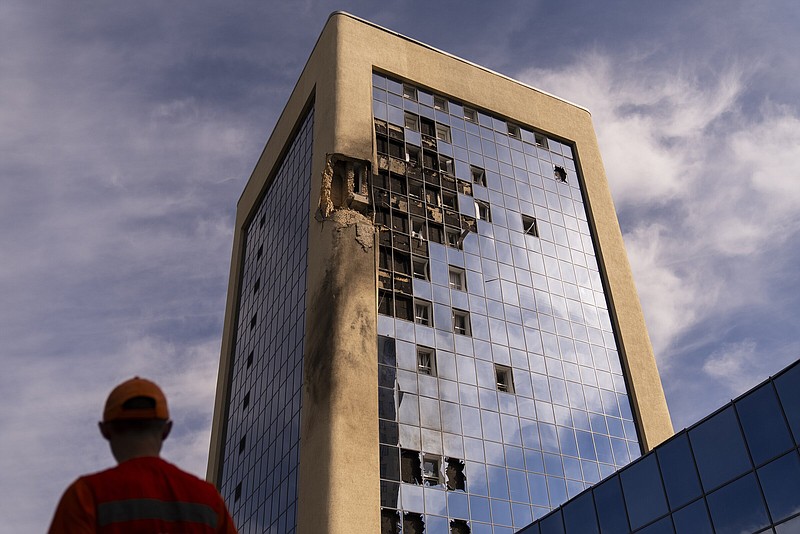Russia struck the Danube River port of Izmail in southern Ukraine early Wednesday, Ukrainian officials said, in a drone attack that targeted a crucial alternative route for grain shipments amid Russia's blockage of Ukrainian ports on the Black Sea.
No injuries were reported in the attack, which sparked a fire, according to Oleg Kiper, the military administrator for the Odesa region, which includes Izmail. Nearly 44,000 tons of grain that had been destined for Africa, China and the Middle East were damaged, Ukraine's infrastructure minister said in a tweet.
Izmail is one of a handful of small ports up the river from the Danube Delta that has emerged as a lifeline for circumventing Russia's de facto naval blockade of major ports along the Black Sea coast. Ships picking up grain at those ports head south to make the Black Sea crossing. However, Russia has indicated that it now considers any vessel entering the Black Sea as potentially hostile.
Ukraine's Defense Ministry said a grain elevator had been damaged in Izmail, a city across the Danube from Romania, a NATO member. Several videos posted on social media showed a predawn blaze several stories high with billowing smoke. Some of the posts said the strike and ensuing fire were clearly visible from a Romanian town on the other side of the river.
In the regional capital of Odesa, a major Black Sea port, a fire broke out at the port after a drone strike, and a grain silo was damaged, Kiper said.
Last week, Russia for the first time hit a port on the Danube when it attacked the town of Reni, across the river from Romania and upstream from Izmail, destroying a grain hangar. That strike was Russia's closest brush with hitting the territory of a NATO member since beginning its full-scale invasion in February 2022.
For Ukraine, the smaller ports on the Danube, the largest river in the European Union by length and volume, became the only shipping portals for millions of tons of grain after Russia declined last month to renew the Black Sea Grain Initiative, which had for a year guaranteed safe passage for Ukrainian food exports.
Russia has attacked Ukraine's ports and grain export facilities since pulling out of the deal and said that it would consider ships sailing to any of those ports a military threat.
Gennadiy Ivanov, the director of BPG Shipping, a Ukrainian shipping company that manages grain-carrying vessels, said on Wednesday that there was a backlog of about 100 vessels in Ukraine's Danube River ports, and that congestion would likely worsen if more infrastructure were attacked. Insurance premiums for vessels operating at those ports are expected to rise, and the costs will be borne by already struggling Ukrainian farmers, he said.
"By trying to destroy infrastructure in the Danube, Russia wants to get Ukraine out of the game completely," Ivanov said, adding, "If Russia continues to destroy the infrastructure, the question is how many terminals can accept vessels."
TURKEY SEEKS TO INTERVENE
Turkey's president has called on Russia and Ukraine to avoid escalating their conflict and urged the resumption of a deal that had enabled Ukraine to export its grain across the Black Sea, President Recep Tayyip Erdogan's office said on Wednesday after he spoke by telephone with his Russian counterpart, Vladimir Putin.
The call, believed to be the first between the leaders since Moscow unilaterally pulled out of the grain deal more than two weeks ago, came after a series of Russian strikes that have damaged Ukrainian port and grain facilities. Those attacks appear intended to deter any effort by Ukraine to export its grain by ship.
Erdogan said that Turkey was working to restore the Black Sea deal, which it helped broker along with the United Nations last summer. "Turkey will keep up with its intense efforts" to reinstate the grain deal, the statement said, adding: "Steps that would escalate the tension in the war between Russia and Ukraine should be avoided."
In its own statement about the call, the Kremlin repeated its position that it would be willing to rejoin the agreement only if its conditions were met, signaling that its stance has not changed since it terminated the deal.
Russia's decision has halted Ukrainian exports that were permitted under the deal, and caused global wheat prices to rise briefly. Because Ukraine is a major producer of grain and other foodstuffs, the agreement had helped keep global food prices stable and alleviate one part of the fallout from Russia's full-scale invasion of Ukraine 17 months ago.
Russia's navy holds sway over the Black Sea, through which the bulk of Ukraine's grain exports travel, giving it considerable leverage in any talks over a resumption of the deal. Moscow has also warned that it would consider any ship approaching one of Ukraine's Black Sea ports to be potentially carrying military cargo.
Moscow says that sanctions imposed by the United States and Ukraine's European allies restrict its ability to sell its agricultural products. Its demands for a resumption of the deal include allowing its agricultural bank access to the international SWIFT banking system, which would facilitate its own grain and other exports.
The Kremlin statement said there had been a "complete lack of progress" in meeting its conditions. It reiterated the government's willingness to supply grain for free to some countries in Africa where a hunger crisis has been exacerbated by Russia's decision.
Erdogan, unusually for the leader of a NATO member, has maintained close ties to Putin since Russia's invasion, and some analysts say that a visit to Turkey by the Russian leader could be key to a resumption of the deal. The Turkish statement said that Putin would visit Erdogan, without specifying a time frame, although the Kremlin statement spoke only of preparations for a "possible meeting" between the leaders.
Information for this article was contributed by Victoria Kim, Safak Timur, Ivan Nechepurenko and Matthew Mpoke Bigg of The New York Times.
Gallery: Images from Ukraine and Russia, month 18
